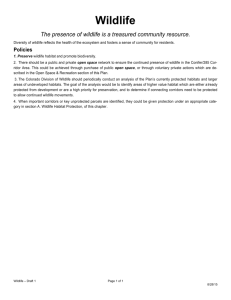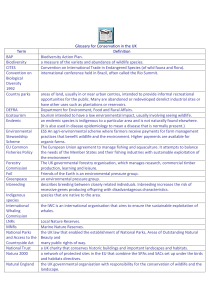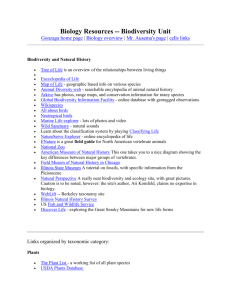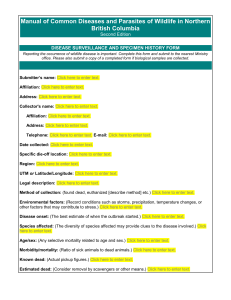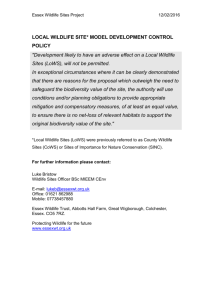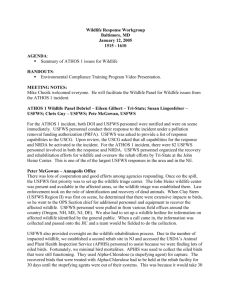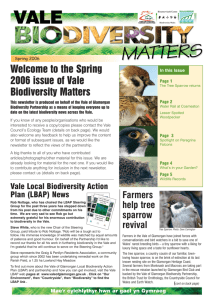triptych-1 - Green Christian
advertisement
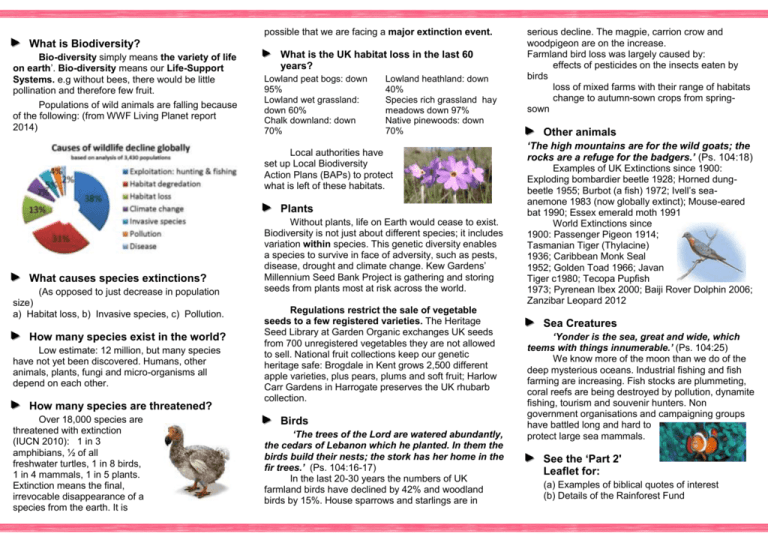
► ► What is Biodiversity? Bio-diversity simply means the variety of life on earth’. Bio-diversity means our Life-Support Systems. e.g without bees, there would be little pollination and therefore few fruit. Populations of wild animals are falling because of the following: (from WWF Living Planet report 2014) possible that we are facing a major extinction event. ► ► What is the UK habitat loss in the last 60 years? Lowland peat bogs: down 95% Lowland wet grassland: down 60% Chalk downland: down 70% Lowland heathland: down 40% Species rich grassland hay meadows down 97% Native pinewoods: down 70% Local authorities have set up Local Biodiversity Action Plans (BAPs) to protect what is left of these habitats. ► ► Plants ► ► What causes species extinctions? (As opposed to just decrease in population size) a) Habitat loss, b) Invasive species, c) Pollution. ► ► How many species exist in the world? Low estimate: 12 million, but many species have not yet been discovered. Humans, other animals, plants, fungi and micro-organisms all depend on each other. ► ► How many species are threatened? Over 18,000 species are threatened with extinction (IUCN 2010): 1 in 3 amphibians, ½ of all freshwater turtles, 1 in 8 birds, 1 in 4 mammals, 1 in 5 plants. Extinction means the final, irrevocable disappearance of a species from the earth. It is Without plants, life on Earth would cease to exist. Biodiversity is not just about different species; it includes variation within species. This genetic diversity enables a species to survive in face of adversity, such as pests, disease, drought and climate change. Kew Gardens’ Millennium Seed Bank Project is gathering and storing seeds from plants most at risk across the world. Regulations restrict the sale of vegetable seeds to a few registered varieties. The Heritage Seed Library at Garden Organic exchanges UK seeds from 700 unregistered vegetables they are not allowed to sell. National fruit collections keep our genetic heritage safe: Brogdale in Kent grows 2,500 different apple varieties, plus pears, plums and soft fruit; Harlow Carr Gardens in Harrogate preserves the UK rhubarb collection. ► ► Birds ‘The trees of the Lord are watered abundantly, the cedars of Lebanon which he planted. In them the birds build their nests; the stork has her home in the fir trees.’ (Ps. 104:16-17) In the last 20-30 years the numbers of UK farmland birds have declined by 42% and woodland birds by 15%. House sparrows and starlings are in serious decline. The magpie, carrion crow and woodpigeon are on the increase. Farmland bird loss was largely caused by: effects of pesticides on the insects eaten by birds loss of mixed farms with their range of habitats change to autumn-sown crops from springsown ► ► Other animals ‘The high mountains are for the wild goats; the rocks are a refuge for the badgers.’ (Ps. 104:18) Examples of UK Extinctions since 1900: Exploding bombardier beetle 1928; Horned dungbeetle 1955; Burbot (a fish) 1972; Ivell’s seaanemone 1983 (now globally extinct); Mouse-eared bat 1990; Essex emerald moth 1991 World Extinctions since 1900: Passenger Pigeon 1914; Tasmanian Tiger (Thylacine) 1936; Caribbean Monk Seal 1952; Golden Toad 1966; Javan Tiger c1980; Tecopa Pupfish 1973; Pyrenean Ibex 2000; Baiji Rover Dolphin 2006; Zanzibar Leopard 2012 ► ► Sea Creatures ‘Yonder is the sea, great and wide, which teems with things innumerable.’ (Ps. 104:25) We know more of the moon than we do of the deep mysterious oceans. Industrial fishing and fish farming are increasing. Fish stocks are plummeting, coral reefs are being destroyed by pollution, dynamite fishing, tourism and souvenir hunters. Non government organisations and campaigning groups have battled long and hard to protect large sea mammals. ► ► See the ‘Part 2' Leaflet for: (a) Examples of biblical quotes of interest (b) Details of the Rainforest Fund Help wildlife N B A T Y E N O H T P 1 2 3 4 5 6 7 8 P E O N L O S O E U M Y E K N O M O H L N A Elephant Brazil nut Leopard Orang-utan Bongo Monkey Bat Mahogany P F T D G Z Y T E L H 9 10 11 12 13 14 15 16 A N A D G O A O P I O L D O P I O P M H Z G M D G I N G E R A A A Fruit Dodo Honey Moth Ginger Frog Ant Ape O R A N G U T A N R N 17 18 19 20 21 22 23 24 I G O R F R U I T B Y L E O P A R D T N A P Amazon Pet Beef Soya Goat Palm Oil Logging Zoo JOIN GREEN CHRISTIAN Send £30 standard (low income £12), £40 family/corporate to GC Membership Secretary, Flat 1, 31 St James Terrace, Buxton SK17 6HS. Cheques payable to Green Christian. For more information contact: GC, 97 Plumpton Avenue, London RM12 6BB, Tel: 0845 459 8460, info@greenchristian.org.uk You are welcome to photocopy this leaflet if you acknowledge GC. November 2015. CEL Registered Charity No. 328744. www.greenchristian.org.uk 10 TopSteps for Saving Wildlife Circle, or tick any you might plan to do 1. Encourage prayers & church services to include God’s earth, & people struggling to protect bio-diversity e.g. farmers, politicians, lawyers. 2. Encourage your church to have a fund-raising event for a habitat conservation charity in GC’s 100 Churches Rainforest Fund Project. Raise £100 to save 1 acre of habitat under threat or buy 1 acre of rainforest – thus showing that respect for Creation is part of Godly living. www.greenchristian.org.uk/100churches 3. Support conservation charities local, national and international, and actively support their campaigns. 4. Ensure any savings are ethically invested and not invested in firms destroying wildlife, e.g. land grabs to buy and destroy forest. 5. Manage your churchyard to benefit wildlife. Plan a Nature Trail. Carry out a GC Church Wildlife Survey 6. Grow old, rare fruit varieties from Brogdale. 7. Garden organically, use peat-free compost, dig a pond; leave wildlife habitats. Remove slabs of concrete. Allow plants to seed in the autumn for birds to feed. Tidy up later! Compost. Grow vegetables. Write here actions you plan to do to help wildlife/plants:- 8. Play nature games at Sunday School & Messy Church. Enable old people in care to go on trips in the outdoors. Walk outdoors yourself each day. 1. ............................................... 2. ................................................. 9. Learn to identify and appreciate local wildlife 10. Buy food that is ‘Wildlife friendly’. Go more vegan. Green Christian is a registered trading name of Christian Ecology Link Saving Wildlife and biodiversity: part 1 ‘Let the heavens rejoice, let the earth be glad; Let the sea resound, and all that is in it. Let the fields be jubilant, and everything in them. Then all the trees of the forest will sing for joy.’ Psalm 96: 11-13 yet: Earth has lost ½ its wildlife in the past 40 years: More specifically: ‘in less than two human generations, population sizes of vertebrate species have dropped by half’ The Living Planet Report 2014-WWF .... how can we help? .. read more


